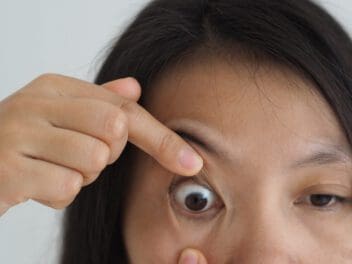Bulging Eyes (Exophthalmos): Guide to Treatment & Causes
Home / Eye Conditions & Eye Diseases /
Last Updated:
Bulging eyes is a condition in which one or both eyes protrude from a person’s eye socket, giving off an appearance of having abnormally large, strained or wide-open eyes. Treatment can include addressing underlying medical conditions, medication adjustments, or in some cases, surgical intervention. Proper diagnosis and timely intervention can help manage the symptoms and improve the quality of life for those affected.
Table of Contents
Bulging eyes can occur due to a variety of reasons such as thyroid eye disease, certain cancers, infections, blood vessel abnormalities, or even trauma to the eye. Each of these causes presents a unique set of challenges and necessitate different approaches for management and treatment.
What Are Bulging Eyes?

Bulging eyes, or exophthalmos, is a condition in which one or both eyes begin to bulge or protrude. The bulging can lead to double vision.
In some cases, exophthalmos may render you unable to drive safely (or legally). If your vision is affected, talk to a doctor about whether it would still be safe to drive or otherwise operate heavy machinery. Refer to local law enforcement about whether you can do so legally. If driving is legal but still deemed unsafe by a doctor, you should still avoid it.
If you notice your eyes bulging or protruding, even if you are not certain it is the case, see a doctor. Permanent vision problems are usually avoidable if you are quick to seek medical help for exophthalmos.
How Do I Know If I have Bulging Eyes?
Identifying whether or not you have bulging eyes can be difficult, particularly if the change has been gradual. Here are some signs and symptoms that might indicate you have exophthalmos:
- The white part of the eye is more visible above or below the colored part of the eye (iris).
- Your eyes appear wide open.
- You are experiencing double vision or difficulty closing your eyes.
- There is a noticeable protrusion of one or both of your eyes.
- You feel increased pressure in your eyes or have a sensation of your eyes being “pushed out.”
You deserve clear vision. We can help.
With 135+ locations and over 2.5 million procedures performed, our board-certified eye surgeons deliver results you can trust.
Your journey to better vision starts here.
Self-examination for Bulging Eyes
To self-examine your eyes, use a mirror in a well-lit area and compare your eyes to old photographs to see if there’s a noticeable difference. Remember, this can only provide a rough estimation. If you suspect that your eyes may be bulging, consult with a healthcare professional immediately.
When to Seek Medical Advice for Bulging Eyes
If you have noticed any of the symptoms mentioned above, it is crucial to seek medical advice. Early detection and treatment can help prevent more serious complications such as vision loss. Keep in mind that bulging eyes can be a sign of various medical conditions, so it’s essential to get a proper diagnosis from a healthcare provider.
Causes of Exophthalmos
The main cause of bulging eyes is Graves’ ophthalmopathy, also known as thyroid eye disease.
This disease affects one in three people who suffer from an overactive thyroid gland. It is most common among middle-aged women and smokers.
Thyroid eye disease causes the immune system to attack fatty tissue and muscles around the eye. This then causes inflammation, which leads to the characteristic bulge.
In some cases, a person with an underactive thyroid gland can experience a similar problem. It is rare for someone with a normal thyroid gland to have thyroid eye disease, but it is possible.
Newborns, who have shallower eye sockets, can also have exophthalmos.
Other Causes of Bulging Eyes
While an overactive thyroid gland or hyperthyroidism manifesting in the form of thyroid eye disease is the most common cause of exophthalmos, there are other notable causes:
- Cancerous tumors near the eye
- Blood vessel abnormalities in the eye
- Eye injury
- Infection of eye socket tissue
- Bleeding behind the eye
Cancers
Several types of cancers may also cause bulging eyes. These cancers include leukemia, neuroblastoma, rhabdomyosarcoma, and lymphoma. Leukemia is a type of cancer that affects white blood cells. Neuroblastoma is a cancer that affects the sympathetic nervous system. Rhabdomyosarcoma is a rare type of cancer that affects soft tissues.
Lymphoma affects the lymphocytes, which are found in bone marrow, lymph nodes, spleen, and other body parts. There are two types of lymphoma: Non-Hodgkin’s and Hodgkin. Most people develop the Non-Hodgkin’s type, which is the most likely to lead to exophthalmos.
Orbital Tumors and Orbital Cellulitis
Orbital tumors are abnormal tissue growth that occurs in the structures surrounding the eyes. Cancerous tumors, hemangiomas, and malignant tumors can also cause exophthalmos.
If a tumor is growing behind your eye, it can cause eye-bulging and requires immediate medical treatment. Orbital cellulitis refers to an inflammation of orbital tissues. The resultant swelling can cause bulging eyes.
Hemangiomas
Abnormal growth of blood vessels can lead to a benign tumor known as hemangioma. There are two types of hemangiomas: capillary and cavernous hemangiomas. Capillary hemangiomas can develop on the eye’s surface, on the eyelid, or in the eye sockets.
When it occurs in the eye socket, it can lead to eye problems, including exophthalmos, glaucoma, and amblyopia (lazy eye). Hemangiomas are more likely to form in developing babies. Hemangiomas affecting the eye can lead to serious problems and require immediate medical attention.
Internal Bleeding
During orbital trauma of any kind, some bleeding may occur in the eye socket. The eye can be pushed forward as the socket fills with blood. Immediate medical attention is needed in these cases to relieve pressure on the optic nerve. The resultant pressure in the eye socket may lead to optic nerve damage.
Treating Bulging Eyes
The correct treatment for exophthalmos is dependent on the cause. Regardless of the root cause, you should first see a doctor. From there, the doctor will help you determine what the problem is.
The initial treatment to the most common cause of exophthalmos, thyroid eye disease, is to correct your thyroid hormone levels. Medication can help your problem from worsening, but it will not always solve your eye symptoms.
The following may also be recommended by a doctor:
- Stop smoking
- Wear sunglasses if you suffer from photophobia
- Raise your head using additional pillows while lying in bed
- Avoid irritants, such as dirt and dust, as much as possible
- Use eye drops to lubricate your eyes as needed

In some cases, this may be all you need, and your exophthalmos will go away with time. For more severe cases, you may need corticosteroids. These are often administered via an injection. Severe side effects are uncommon, but some people may experience agitation, headache, and sleep problems while on corticosteroids.
If corticosteroids prove ineffective, orbital or retrobulbar radiotherapy may be used on its own or in conjunction with corticosteroids. This type of treatment uses high levels of radiation to destroy cells and reduce swelling. When done correctly, the risks are mostly controlled to your eyes. Risks include short-term vision problems, cataracts, and (in rare cases) retinopathy, which can threaten eye sight.
In cases of severe or persistent exophthalmos, surgery may be necessary to reduce the swelling, improve vision, or improve the appearance of the eye. Generally speaking, this surgery will take one of three forms.
- Eyelid surgery: This is when the eye is surgically altered to improve its appearance, position, or closure.
- Eye muscle surgery: This surgery adjusts the muscles around the eye to align your eyes, helping to lessen double vision.
- Orbital decompression surgery: Done to improve the appearance of the eye and reduce pressure on the optic nerve, this surgery involves removing a small amount of bone from the eye socket.
While some of the above applies to treating all causes of exophthalmos, it is generally assumed that thyroid eye disease causes the condition. If this is not the case, the treatment may be different.
Infections are generally treated with antibiotics, and abscesses sometimes need to be drained. The best way to approach cancerous tumors varies, but treatment can involve chemotherapy, radiotherapy, and surgery.
As with any treatment plan, always listen to your doctor. The long recovery time from exophthalmos can sometimes be disheartening, but following your doctor’s advice gives you the best chance of full recovery.
You deserve clear vision. We can help.
With 135+ locations and over 2.5 million procedures performed, our board-certified eye surgeons deliver results you can trust.
Your journey to better vision starts here.
Preventing Bulging Eyes
There are some self-care actions that you can undertake to prevent exophthalmos. They include:
- Quitting smoking as smoking increases the risk of aggravating eye problems.
- Regular blood test to check for the proper functioning of the thyroid glands.
- Treating the underlying causes of thyroid problems to stabilize hormones.
- Avoid trauma to the eye as much as possible (wearing protective eyewear during activities)
Prognosis
If you are quick to see a doctor once you notice a problem, exophthalmos usually does not lead to permanent vision loss. The first goal is to get the inflammation under control. The appearance of the eye, the recovery timeline, and the potential for permanent damage depend on the severity of the exophthalmos.
If permanent damage is likely, even if only in terms of appearance, there are surgeries available to alter appearance and fix any misalignment of your eyes.
You deserve clear vision. We can help.
With 135+ locations and over 2.5 million procedures performed, our board-certified eye surgeons deliver results you can trust.
Your journey to better vision starts here.
References
- Overview: Exophthalmos (Bulging Eyes). (October 11, 2016). UK NHS.
- Treatment: Exophthalmos (Bulging Eyes). (October 11, 2016). UK NHS.
- Everything You Need to Know About Exophthalmos. (May 2017). MedicalNewsToday.
- What Is Hemangioma? (April 21, 2020). American Academy of Ophthalmology.
- What You Should Know About Bulging Eyes. (August 1, 2019). Healthline.
- Understanding mechanisms of pressure-induced optic nerve damage. (March 2005). National Center for Biotechnology Information.
- Treatment: Exophthalmos (bulging eyes). (October 29, 2019). National Health Service.
This content is for informational purposes only. It may have been reviewed by a licensed physician, but is not intended to serve as a substitute for professional medical advice. Always consult your healthcare provider with any health concerns. For more, read our Privacy Policy and Editorial Policy.
